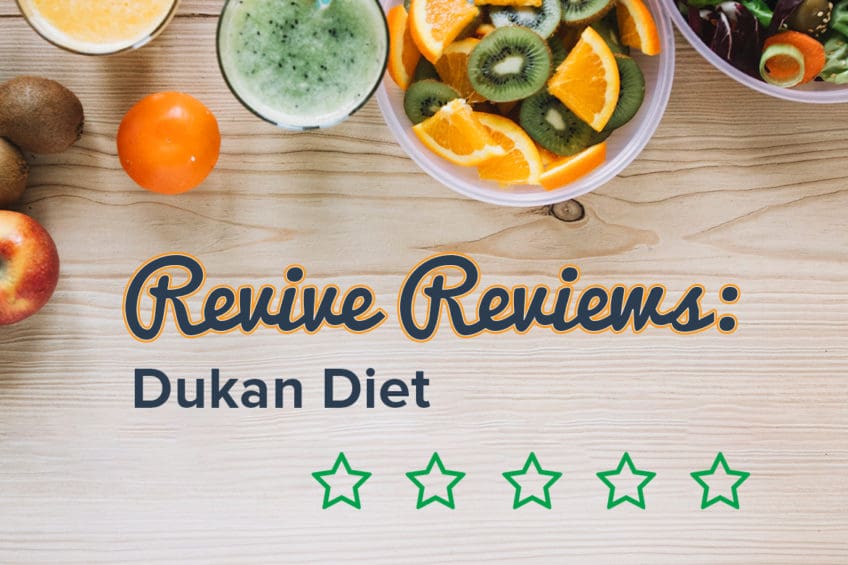Revive Reviews: The Dukan Diet
The Dukan diet is a high protein, low calorie, four-step program. The first two phases aim to help dieters shed pounds quickly and obtain motivation to continue on the diet, and the second two phases aim to maintain weight loss permanently.
Phase 1 – ATTACK
This includes 68 high protein foods for “pure protein” days. In addition to lean meat, fish, shellfish, skinless poultry (with the exception of goose and duck), eggs, tofu, seitan, nonfat dairy products are also allowed and 1.5 tablespoon / day of oat bran is required.
Phase 2 – CRUISE
An additional 32 vegetables are added to the diet, alternating “pure protein” days and protein plus non-starchy vegetable days, with a required 2 tablespoon / day of oat bran every day. You are expected to obtain what the Dukan Diet calls your “True Weight” at the end of this phase.
Phase 3 – CONSOLIDATION
This is the first stage of the maintenance phases of the Dukan Diet. It lasts 5 days per every pound lost in Cruise Phase. Dieters can eat unlimited amounts of protein and non-starchy vegetables and can also reintroduce limited amounts of fresh fruit, whole-wheat bread and cheese. They can also enjoy two weekly servings of starchy foods, such as pasta, beans or potatoes – called “celebration” meals. To balance the newfound freedom of this phase, readers must follow the pure protein diet from the Attack Phase for one day a week, and they must still consume 2 tablespoon / day of Oat Bran everyday.
Phase 4 – PERMANENT STABILIZATION
Dieters are expected to keep up this newly learned pattern of eating for the rest of their life to maintain their “True Weight.” Dieters also must follow these 3 non-negotiable rules:
- Consume 3 Tablespoons of oat bran per day
- Choose to take the stairs whenever possible.
- Have a pure-protein Thursday, i.e. Attack Phase menu.
Cost
$80.00 for the first 3 phases once you join the coaching section on their website; phase 4 is then $1.00/week. The Dukan Diet Book and Dukan Diet Cookbook range from $20-30. Food products are also sold on the website.
Pros:
- Recommends some healthy choices like lean cuts of protein, mild exercise, moderate salt intake and strives for lifelong weight management
- Can be a good fit for those who need a highly structured plan.
Cons:
- Very rigid
- Emphasis on animal protein – not suited for many diets or vegetarians
- Due to extreme restriction of carbohydrates, initial weight loss is likely water and muscle loss
- The body is pushed into a state of Ketosis – using fat stores for fuel as there will be minimal carbohydrate for vital organs to use for energy. Ketosis is linked to health problems such as kidney damage and gout. The extremely-restrictive Attack Phase can also cause fatigue, bad breath, constipation and dry mouth.
This highly restrictive diet will definitely make you loose weight, whether you can actually sustain it in the long term is questionable at best. It deprives you of other major food groups and the important nutrients each food group gives your body to be able to function. It raises major health concerns and the rapid weight loss will not only be fat, but fluids and muscle mass – and muscle mass can be very difficult to replace. It assumes that there is one answer for everyone and does not teach you about a variety of healthy eating choices or healthy lifestyle changes. You would be better off skipping over this fad diet.
Would a dietitian eat this way?
Maybe and no.
Phase 1: No. Only eating protein all day long would not only be very unpleasant but it is unbalanced and can result in a low intake of important vitamins, minerals and nutrients. Fibre would be one of those key nutrients missing, this could cause gastrointestinal discomfort and constipation.
Phase 2: No. Although this phase of the diet adds in vegetables, it is still a very high protein/ low carbohydrate diet. This diet states that this ratio of macronutrients will result in quick weight loss. However, research shows that a low carbohydrate diet does not equate to more weight loss in the long term.
Phase 3 & 4: Maybe. A dietitian would eat this way if the meals could be balanced. The diet now allows carbohydrate rich foods back into your routine, therefore if you are able to include ¼ of your plate with carbohydrate, ¼ of the plate with protein and ½ the plate with vegetables the balance would be present. The celebration days are a red flag. As humans we have been taught to use food as a reward which can be detrimental to weight management and create bad habits.
Finally, a dietitian would not follow the one day a week protein day in phases 3 & 4 for the same reasons stated above.
Ready to Ditch the Diet for Good?Revive Wellness is a team of passionate and evidence-based Registered Dietitians specialized in nutrition and wellness coaching for the Edmonton area.
References:
Academy of Nutrition and Dietetics. (2011). The Dukan Diet By Dr. Pierre Dukan. Eat Right.org. Retrieved March 20, 2013 from http://www.eatright.org/Media/content.a spx?id=6442464088#.UUnS9aXqo_t
Diet Coaching, Inc. (2012). The Dukan Diet. DukanDiet.com. Retrieved March 20, 2013 from http://www.dukandiet.com/The-Dukan-Diet
Kim. (2011, March). You Can Dukan – But Does That Mean the Dukan Diet is Right for You?. Kimthedietitianweblog. Retrieved March 20, 2013 from http://kimthedietitian.wordpress.com/2011/03/27/you-can-dukan-but-that-doesnt-mean-you-should/

